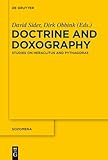Doctrine and Doxography : Studies on Heraclitus and Pythagoras / ed. by David Sider, Dirk Obbink.
Material type: TextSeries: Sozomena : Studies in the Recovery of Ancient Texts ; 14Publisher: Berlin ; Boston : De Gruyter, [2013]Copyright date: ©2013Description: 1 online resource (349 p.)Content type:
TextSeries: Sozomena : Studies in the Recovery of Ancient Texts ; 14Publisher: Berlin ; Boston : De Gruyter, [2013]Copyright date: ©2013Description: 1 online resource (349 p.)Content type: - 9783110331165
- 9783110331370
- 182 .2 23
- B223 .D63 2013eb
- online - DeGruyter
- Issued also in print.
| Item type | Current library | Call number | URL | Status | Notes | Barcode | |
|---|---|---|---|---|---|---|---|
 eBook
eBook
|
Biblioteca "Angelicum" Pont. Univ. S.Tommaso d'Aquino Nuvola online | online - DeGruyter (Browse shelf(Opens below)) | Online access | Not for loan (Accesso limitato) | Accesso per gli utenti autorizzati / Access for authorized users | (dgr)9783110331370 |
Frontmatter -- Preface -- Abbreviations -- Contents -- I. Pythagoras -- 1. Philosophy’s Numerical Turn -- 2. Pythagorean Communities -- 3. Aristotle on the Pythagoreans -- 4. Philolaus’ Critique of Heraclitus -- II. Heraclitus -- 5. Heraclitus, the Rival of Pythagoras -- 6. Early Natural Theology -- 7. Heraclitus on Measure and the Explicit Emergence of Rationality -- 8. On the physical aspect of Heraclitus’ psychology -- 9. How Not to Conceive Heraclitean Harmony -- 10. Heraclitus on Logos -- 11. Once More unto the Stream -- 12. Heraclitus’ Ethics -- Contributors -- General Index -- Index Locorum Potiorum
restricted access online access with authorization star
http://purl.org/coar/access_right/c_16ec
Pythagoras and Heraclitus developed theories of the universe and mankind’s place in it which were taken seriously by all later Greek thinkers. None of their works remains, however, except in later paraphrases that all too often are misrepresentations. Pythagoras had followers who attributed their own ideas to their master; Heraclitus wrote in a prose style so ambiguous that he came to be known as the Shadow, so that even the most earnest attempts to paraphrase his views had to smooth out his intentional rough edges. Nonetheless, enough remains to allow the authors of this volume, edited by David Sider and Dirk Obbink (Oxford), to offer new ways of viewing their views and the way others perceived them. The contributors are Gábor Betegh (Budapest), Roman Dilcher (Heidelberg), Aryeh Finkelberg (Tel Aviv), Daniel Graham (Brigham Young University), Herbert Granger (Wayne State University), Carl Huffman (DePauw), Enrique Hülsz Piccone (Mexico City), Anthony Long (Berkeley), Richard McKirahan (Pomona), Catherine Rowett (East Anglia), David Sider (New York), and Leonid Zhmud (St. Petersberg).
Issued also in print.
Mode of access: Internet via World Wide Web.
In English.
Description based on online resource; title from PDF title page (publisher's Web site, viewed 28. Feb 2023)


